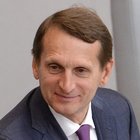During a working visit to Vienna, Chief of Staff of the Presidential Executive Office Sergei Naryshkin met with Austrian Federal President Heinz Fischer, as well as Austrian Federal Minister of the Interior Johanna Mikl-Leitner.
“Russia sees Austria as a partner,” Sergei Naryshkin stated following the meetings. “Our relations are developing in an atmosphere of openness and trust, taking into account Russia and Austria’s mutual interests.” During the meetings in Vienna, Mr Naryshkin and his Austrian colleagues discussed matters of bilateral relations, including the development of an agreement on mutual facilitation of visa regime for the two nations’ citizens.
Within the framework of his working trip, Sergei Naryshkin visited the International Anti-Corruption Academy (IACA), founded in September 2010, which became a full international organisation in March 2011. Mr Naryshkin and chair of IACA’s International Transition Team Martin Kreutner discussed issues pertaining to the Academy’s operations, as well as the substantive content of its work. “Russia is a founder and donor to the International Anti-Corruption Academy. We expect that the Academy will become a prestigious centre for education, professional training, and scientific research in the field of fighting corruption,” Sergei Naryshkin remarked during the meeting.
The Chief of Staff of the Presidential Executive Office spoke about fighting corruption at the Vienna International Centre where he addressed ambassadors and permanent representatives of UN member-states accredited at international organisations in Vienna.
Mr Naryshkin also met with Under-Secretary-General of the United Nations and Executive Director of the UN Office on Drugs and Crime Yury Fedotov, along with heads of leading international organisations working under the aegis of the United Nations office in Vienna.
Sergei Naryshkin and Deputy Federal Minister of the Interior Hermann Feiner laid wreaths at the monument to Soviet soldiers who perished during the liberation of Vienna. “It is gratifying to note Austrians’ measured, careful attitude toward understanding the tragic events of the Second World War. It can be seen in the sincere concern for the memorials and burial sites of Soviet troops who died fighting for Austria’s liberation,” Sergei Naryshkin stressed.

